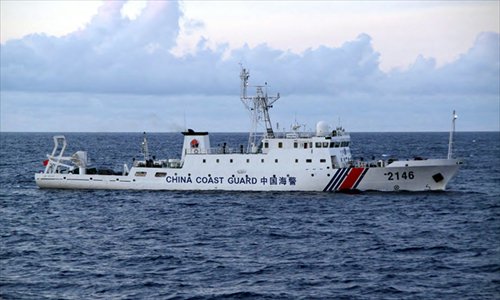China warns Japan against sending govt staff to islands

This handout picture taken and released by the Japan Coast Guard shows a China Coast Guard ship cruising near the Diaoyu Islands in the East China Sea on Thursday. Photo: AFP / Japan Coast Guard
China reacted strongly toward Japan's remarks Tuesday about considering stationing government workers on the Diaoyu Islands, warning that Japan must bear the consequences for any "escalated provocation" against Chinese sovereignty.
"The Chinese government has an unshakeable resolve and determination to protect the country's territorial sovereignty and will not tolerate any provocative acts of escalation over China's sovereignty," Chinese Foreign Ministry spokesman Hong Lei told a daily news briefing in Beijing on Tuesday, the first anniversary of Tokyo's announcement to "nationalize" the Diaoyu Islands.
Sino-Japanese relations have reached a new low since last September, with Japanese exports to China, especially automobiles, yet to recover. The Chinese government has been showing increasing determination in preserving its sovereignty over the Diaoyu Islands, including deploying regular patrol ships around the troubled waters.
Japan's Chief Cabinet Secretary Yoshihide Suga said on Tuesday at a press meeting that it was "extremely regrettable" that Chinese government ships had repeatedly entered what he described as the country's territorial waters.
The government of Prime Minister Shinzo Abe was making "resolute but calm responses to defend our territory, territorial waters and airspace decisively," he said, adding Japan will never make a concession on a matter of sovereignty.
Asked if Japan might station government workers on the islands, Suga said: "That is one option."
The remarks drew "grave concern" from the Chinese government.
"If the Japanese side recklessly makes provocative moves, it will have to accept the consequences," Hong said.
Analysts said Japan is responsible for pulling Sino-Japanese ties down a deteriorating slope.
"For more than 30 years China and Japan have laid the dispute aside because it is not a problem that can be easily tackled. Whoever opened the 'Pandora's box' must answer for the conflicts it unleashed," Li Wei, director of the Institute of Japanese Studies at the Chinese Academy of Social Sciences, told the Global Times.
Relations between the two countries have also been overshadowed in the past year by Tokyo's refusal to properly atone for wartime atrocities committed by Japanese soldiers in China and Abe's continuous efforts to revise Japan's pacifist constitution in order to gain the power to carry out pre-emptive strikes.
"What Japan has done in the past year, including its strong insistence that there is no dispute over the islands, showed little will for compromise and no space for negotiation. With the situation now in a stalemate, the important question for both sides is how to control the tensions and how to find a new 'equilibrium point' to retain peaceful relations, despite the grave difficulties," said Li.
China has refused to arrange a formal meeting between Chinese and Japanese leaders at the St Petersburg G20 summit. At a casual encounter with Abe, Chinese President Xi Jinping reiterated that Japan must squarely face history and deal with the Diaoyu issue to show its sincerity in easing Sino-Japanese ties.
Liu Junhong, a research fellow with the Institute of Japanese Studies at the China Institutes of Contemporary International Relations, said that Japan's move to stir up tension could serve to increase its strategic value to the US as it rebalances its Asia-Pacific strategy.
In the latest incident off the islands, a seven-ship fleet from the China Coast Guard patrolled the waters surrounding the Diaoyu Islands Tuesday morning, marking the 59th Diaoyu Islands patrol by Chinese law-enforcement vessels since September 2012.
On Monday, Japan scrambled fighter jets when it spotted what appeared to be an unmanned drone aircraft flying near the Diaoyu Islands on the East China Sea.
It was not clear which country the unidentified aircraft belonged to but Japan made an inquiry about it with the Chinese side, Suga said.
Japanese Defense Minister Itsunori Onodera said on Monday that Japan would be on guard for the first anniversary of Japan's "purchase" of the islands, adding that "a firm posture is being called for" on the day when the flare-up of tension was triggered.
"The standoff will continue and the prospects do not look promising for the near future. Both countries have suffered in the stalemate, but in the long run, Japan will lose much more," Xu Jingbo, a well-known commentator and writer based in Japan, wrote on his blog.
Zhao Jingshu and agencies contributed to this story